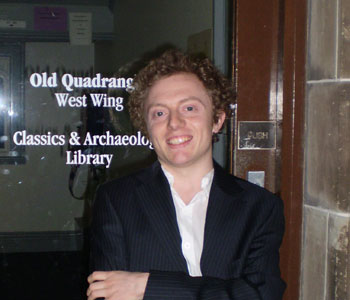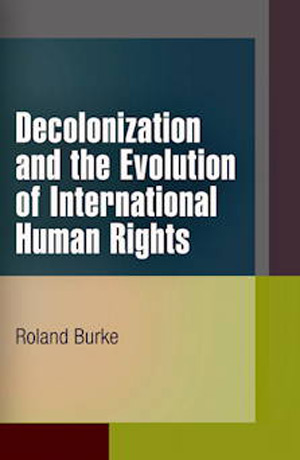
My book charts the shifting impact of decolonization on the human rights project. I challenge the presumption that the colonized were marginal players in the construction of the human rights order. Using new archival research, I demonstrate the decisive influence of post-colonial figures on the key debates that shaped the human rights system.
In 1948, the UN General Assembly passed the Universal Declaration of Human Rights, the cornerstone of a global movement to promote and protect individual freedoms across the world. Yet the General Assembly that claimed to speak for the world represented only part of it, with much of Asia and Africa outside the halls of the UN, their voices muted under the rule of European empires.
As these empires collapsed, the debate on human rights became truly universal.
By the 1960s, it was a chorus of former colonies that determined its trajectory. In an era when the superpowers dominated so much of the international agenda, in the sphere of human rights, it was the voices of the nascent “Third World” that dictated proceedings—often to the irritation and despair of their Western counterparts.
During the 1950s, it was those who had been left out of the deliberations of 1947 and 1948 that were the most ardent and articulate champions of universality—confounding the claims of critics who cited insuperable cultural differences between the civilizations of Europe and those of the former colonies.
Less than a decade later, the Third World’s embrace of universality had begun to loosen, with a wave of assertive dictatorships denigrating the vision set out in 1948.
Unlike almost all other arenas in the Cold War period, the UN General Assembly, and in particular, the human rights program it supervised, were a field where the least powerful states led the most powerful.
By the 1990s, major political leaders routinely dismissed human rights as a project dominated by the West, and demanded, admittedly without success, a wholesale revision of the principles laid down in 1948.
“I recover the story of those battles fought to make human rights truly universal, to outlaw racial discrimination, and discredit the eloquent excuses of colonialism. Then the book illuminates the depressing reversal of that universality, as the post-colonial world lapsed into the kind of authoritarianism it had once struggled against.”
This book originated in the search for the origins of contemporary skepticism on the universality of human rights—a skepticism exemplified by the 1990s controversy on “Asian Values,” and more recent debates on the compatibility of Islam and women’s rights.
Were post-colonial leaders, and anti-colonial nationalists, always hostile to the idea of universal values? When did the critique of universality, so prevalent in the modern era, actually emerge? As it turns out, when you look at the archives, speeches, and UN records, it was not a defining feature of early anti-imperialism. Counterintuitively, it was the crusading European imperialists who were the most careful to defer to the claims of cultural particularity, at least when it suited them.
Literature on the universality of rights has often been consumed by the abstract propositions of political theorists and philosophers, who argue about the virtue of rights in a way far removed from their operation and historical evolution. I sought to approach the problem of human rights and the post-colonial world by looking at what happened—what was said, and what was done, in the great debates on human rights.
As impressive as the gladiatorial struggles of philosophical argument may be, they were not, ultimately, what determined the fate of human rights on the international political stage. The passage of the 1965 International Convention on the Elimination of All-Forms of Racial Discrimination, for example, rested not on the logical power of the case for human equality, but on the skilful rhetoric and diplomacy of its champions—champions from countries like Ghana and the Philippines.
Beyond the perennial conflict on the question of universality, I sought to examine the way the human rights ideas circulated, both within the UN across the world. An impressive body of scholarship has been devoted to the history of the most famous UN initiative, the Universal Declaration. But historical attention to the decades that followed has been, in real terms, quite threadbare. I wanted to explore what happened after that 1948 momentous session of the General Assembly—those grand articles of the Declaration had been announced to the world, but what would happen next? Who would take the place of the great architects of the Declaration—the American Eleanor Roosevelt, the Frenchman René Cassin, and the Canadian John Humphrey?
It was, overwhelmingly, those from the newly independent countries, and countries outside the West. The fate of the program was inherited by figures like Salvador Lopez from the Philippines, Mohammed Abu Rannat of Sudan, and the Iraqi delegate Badia Afnan. For better or worse, the future of the UN effort on human rights was no longer in Western hands.
Two sections of the book exemplify its arguments and their significance—and it would be wonderful if, in the hands of a reader, the volume serendipitously fell open at them, preferably out of sequence.
The first relates to the notion of cultural relativism, on page 119. The constant refrain from those who attack universal human rights is that their universality is illusory, a neo-colonial imposition on societies outside the West. Yet in October 1950, it was those countries which wanted to retain control of their colonies that invoked the problems of cultural difference. Defenders of European colonialism feigned respect for Asian and African tradition and culture as an excuse for weakening the principle of universality in the new draft human rights treaty. By contrast, the Iraqi, Egyptian, and Indian delegations argued against the notion of cultural differences—and successfully insisted on the universal application of rights.
Far from being the handmaiden of imperialism, universality was, in fact, the prime weapon of those representatives who sought the end of colonial rule. Universal human rights were an integral part of decolonization—exalted as a set of ideas for liberation, not oppression. Given the later record of so many post-colonial regimes, their sincerity might be seriously questioned, but in these early days, it seemed real enough. And in terms of effects, this outspoken advocacy sharply strengthened the principle of the same rights for all, regardless of tradition, nationality, or culture.
If the reader accidentally dropped the book again, I would hope it fell open to page 108. Here, a short vignette illustrates the level of control the Third World would gain over the human rights agenda.
At the First World Conference on Human Rights, held in Tehran in April 1968, the decolonized utterly dominated proceedings—so much so that an unlikely marriage was made between the US and the Soviet negotiating teams. Driven together by their frustration at being sidelined from the proceedings, American and Soviet diplomats grumbled to each other about being “exploited.”
By the last week of the conference, the two Cold War enemies were sharing lunch in the US embassy, and the American diplomatic cables were reporting back that it was “comforting to know that even Soviets have their troubles and annoyance with small-time prima donnas who gang up to throw their weight around.” Instead of the usual sterile Cold War polemics, the two superpowers agreed, in the words of the US delegation, to “take it easy on each other.”
Nothing better encapsulates the unusual dynamics of the human rights debate, where the strongest states in the world were reduced to consoling each other about their lack of control, sharing meals together as the Third World representatives wrote their priorities into the conference Proclamation.
“Far from being the handmaiden of imperialism, universality was, in fact, the prime weapon of those representatives who sought the end of colonial rule. Universal human rights were an integral part of decolonization—exalted as a set of ideas for liberation, not oppression.”
Today, the legitimacy of human rights often seems to rest on competing arguments about their past formulation. Much of the rhetorical armamentarium employed by the planet’s most egregious dictatorships pivots on the claim that their cultural and traditional values were not accounted for in the development of the international human rights system.
From atheist autocrats, to Islamic theocrats, to African kleptocrats, assertions of exclusion and marginalization reside at the heart of attacks on human rights standards as imperialist, inapplicable, and illegitimate. Such assertions were at the heart of the Islamic Republic of Iran’s repudiation of the Universal Declaration in 1984, and its attacks on democratic dissent in 2009. Yet a previous generation of leaders and diplomats, many of whom were directly engaged in winning independence, actively fought for those very same standards against real—and well-armed—imperialists from Britain, France, and the Netherlands.
My book provides an insight into the complex history of Third World engagement in the birth of the modern human rights order. I recover the story of those battles fought to make human rights truly universal, to outlaw racial discrimination, and discredit the eloquent excuses of colonialism. Then the book illuminates the depressing reversal of that universality, as the post-colonial world lapsed into the kind of authoritarianism it had once struggled against.
Across the work, my focus remains on those voices from outside the West. Voices that both consolidated and compromised the hopeful vision of rights for all that was announced in their absence in 1948.


Roland Burke lectures in history at Latrobe University, Bundoora, Australia. His doctorate, completed in 2007, was awarded the Chancellor’s Prize for Excellence (2008) at the University of Melbourne, and his research has appeared in leading academic journals, including Human Rights Quarterly. Roland’s new research project will document the intellectual history of opposition to human rights, from the French Revolution to modern day Islamism.